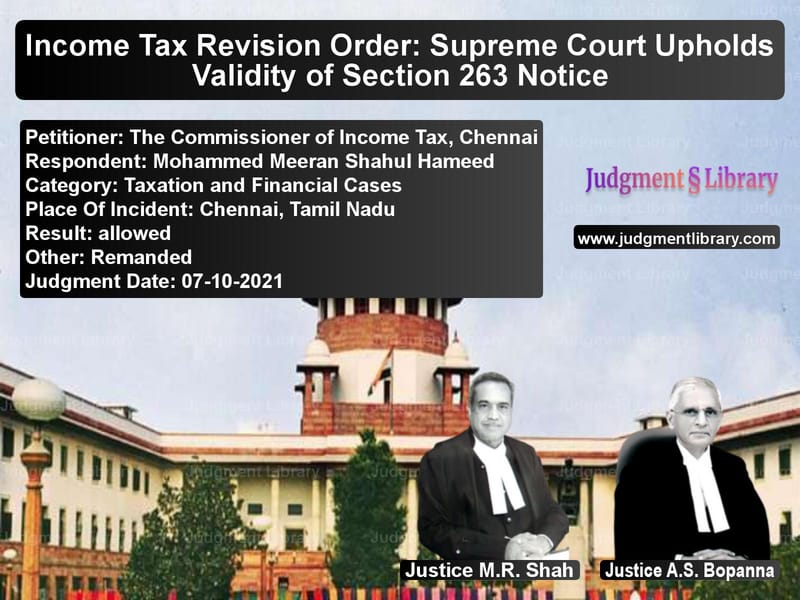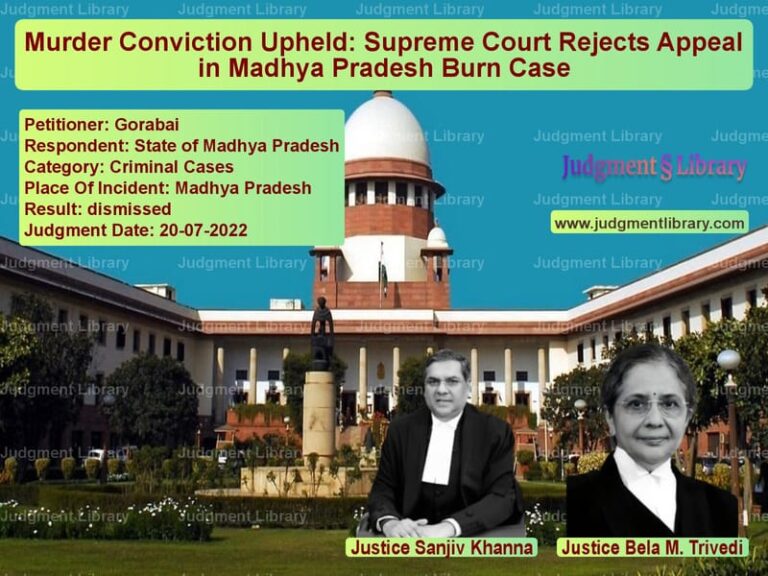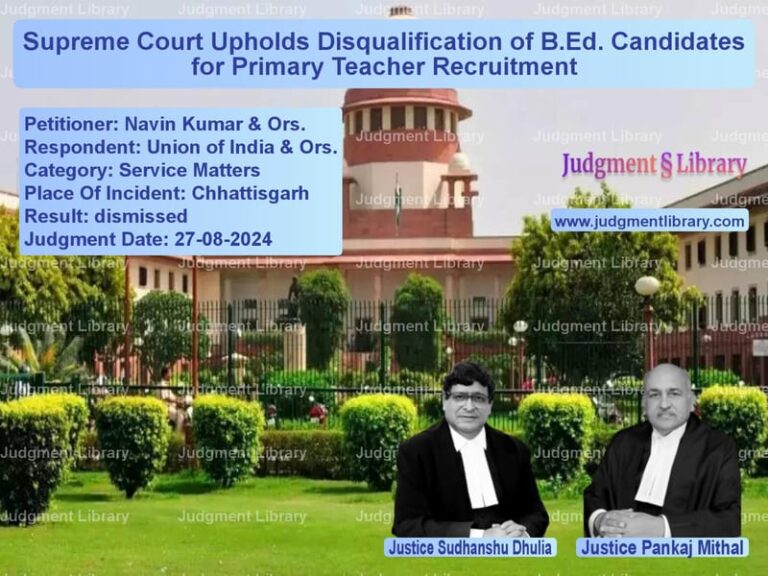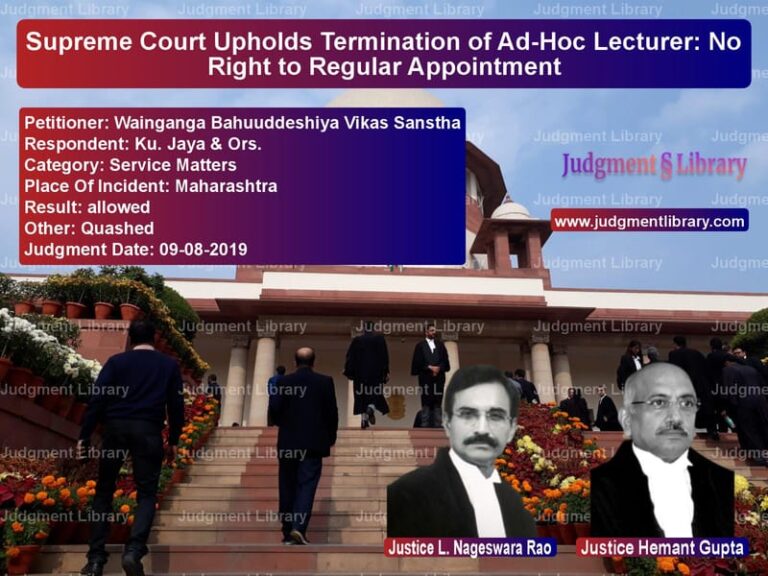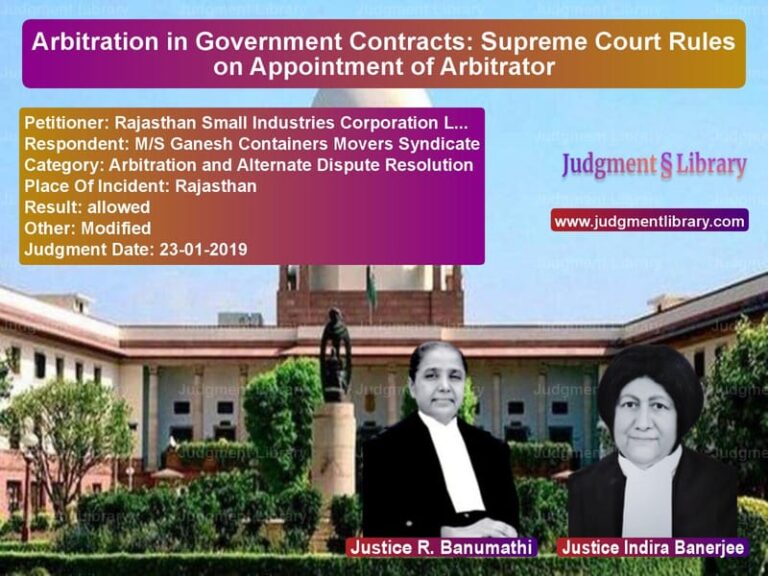Income Tax Revision Order: Supreme Court Upholds Validity of Section 263 Notice
The Supreme Court of India, in the case of The Commissioner of Income Tax, Chennai v. Mohammed Meeran Shahul Hameed, addressed a crucial issue regarding the limitation period for revision orders under Section 263 of the Income Tax Act, 1961. The case, Civil Appeal No. 6204 of 2021, arose from an appeal challenging the Madras High Court’s ruling that a revision order issued by the Commissioner of Income Tax was barred by limitation. The Supreme Court, in its judgment dated October 7, 2021, delivered by M.R. Shah and A.S. Bopanna, upheld the validity of the revision order and clarified the correct interpretation of the limitation period under Section 263(2) of the Act.
Background of the Case
The case revolved around an assessment order passed under Section 143(3) of the Income Tax Act for the Assessment Year 2008-09. The Commissioner of Income Tax initiated revision proceedings under Section 263 of the Act, concluding that the assessment order was erroneous and prejudicial to the interest of the revenue. A notice was issued to the assessee on February 1, 2012, and the revision order was passed on March 26, 2012. The order was dispatched on March 28, 2012.
The assessee filed an appeal before the Income Tax Appellate Tribunal (ITAT), contending that the revision order was time-barred as he received it only on November 29, 2012. The ITAT ruled in favor of the assessee, quashing the revision order on the ground that it was served beyond the two-year limitation period. The High Court upheld this decision, leading to the Revenue’s appeal before the Supreme Court.
Key Legal Issues Before the Court
- Whether the date of passing the order or the date of receipt by the assessee determines the limitation period under Section 263(2)?
- Whether the ITAT and the High Court erred in quashing the revision order as time-barred?
- Whether the Revenue’s interpretation of the limitation period was legally valid?
Petitioner’s Arguments
The Revenue, represented by Additional Solicitor General Vikramjit Banerjee, contended that:
- The limitation period under Section 263(2) is to be counted from the date the order is made/passed, not the date of receipt by the assessee.
- The revision order was passed on March 26, 2012, well within the two-year limitation period, which ended on March 31, 2012.
- As per the statutory language of Section 263(2), the term used is “made”, not “received”, which means that dispatch or delivery to the assessee is not relevant for computing limitation.
- The High Court erred in assuming that the limitation period extends until the date of service on the assessee, as there is no such requirement in the statute.
Respondent’s Arguments
The assessee, Mohammed Meeran Shahul Hameed, countered that:
- The order was received only on November 29, 2012, which was beyond the limitation period.
- The statutory limitation under Section 263(2) should include the date of service to ensure the assessee’s right to challenge the order in time.
- The ITAT and the High Court rightly ruled that the period of limitation should be computed from the date the assessee gets notice of the order.
- If the Revenue’s interpretation was accepted, the Commissioner could pass orders at the last minute and delay service, limiting the assessee’s ability to respond.
Supreme Court’s Judgment
The Supreme Court ruled in favor of the Revenue, holding that the limitation period under Section 263(2) begins from the date the order is made/passed. The key findings were:
- The statutory language of Section 263(2) clearly states that no order shall be made after two years from the end of the relevant financial year.
- The law does not require that the order must be served within the limitation period.
- The ITAT and the High Court misinterpreted the provision by introducing a requirement of receipt that does not exist in the statute.
- As long as the order was passed within the prescribed period, it remains valid, irrespective of when it was received.
Key Extract from the Judgment
“The word used is ‘made’ and not ‘received’ or ‘dispatched.’ Once it is established that the order under Section 263 was passed within two years from the end of the financial year, it cannot be said to be beyond the period of limitation.”
Final Verdict
- The Supreme Court allowed the appeal and set aside the ITAT and High Court’s orders.
- The revision order issued by the Commissioner of Income Tax was held to be valid and within limitation.
- The Court directed that the matter be remanded to the ITAT for reconsideration on merits.
Impact of the Judgment
This ruling clarifies an important issue in tax law regarding the computation of limitation periods. The decision:
- Reaffirms that statutory language must be interpreted as written, without adding unwarranted conditions.
- Prevents undue litigation based on procedural delays in service of orders.
- Ensures that tax authorities have clear guidelines on issuing revision orders.
- Provides certainty to taxpayers about the validity of tax revision orders.
This case sets an important precedent for future tax disputes involving revision orders and statutory timelines.
Petitioner Name: The Commissioner of Income Tax, Chennai.Respondent Name: Mohammed Meeran Shahul Hameed.Judgment By: Justice M.R. Shah, Justice A.S. Bopanna.Place Of Incident: Chennai, Tamil Nadu.Judgment Date: 07-10-2021.
Don’t miss out on the full details! Download the complete judgment in PDF format below and gain valuable insights instantly!
Download Judgment: the-commissioner-of-vs-mohammed-meeran-shah-supreme-court-of-india-judgment-dated-07-10-2021.pdf
Directly Download Judgment: Directly download this Judgment
See all petitions in Income Tax Disputes
See all petitions in Tax Evasion Cases
See all petitions in Tax Refund Disputes
See all petitions in Judgment by Mukeshkumar Rasikbhai Shah
See all petitions in Judgment by A. S. Bopanna
See all petitions in allowed
See all petitions in Remanded
See all petitions in supreme court of India judgments October 2021
See all petitions in 2021 judgments
See all posts in Taxation and Financial Cases Category
See all allowed petitions in Taxation and Financial Cases Category
See all Dismissed petitions in Taxation and Financial Cases Category
See all partially allowed petitions in Taxation and Financial Cases Category

